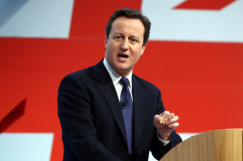David Cameron has responded to the Archbishops of York and Canterbury's criticism of income inequality in Britain by saying he "profoundly disagree[s]" with their assessment.
Speaking in Washington, Cameron defended the Church's "perfect right to speak out" on political issues, but added: "under this Government inequality has fallen so I don't think the picture they paint is accurate".
"I look forward to debating and discussing it with them. They have a right to speak out as long as they don't mind when I speak pretty vigorously in defence of the excellent economic and social record of this government," he said.
"The fact is you can't do any of these things in terms of tackling poverty, growing opportunity, rebalancing the economy unless you have a strong economy and we have restored or are restoring the strength of the British economy."
The Prime Minister's comments follow the publication of excerpts from a collection of essays on the problem of inequality in the UK. The book, entitled, 'On Rock or Sand? Firm Foundations for Britain's Future' will be published next week. Both John Sentamu and Justin Welby have written a chapter.
According to the Telegraph, the Archbishops accuse the Coalition government of selling a "lie" that economic growth is the solution to all of Britain's social problems.
"We believe that if we can fix the economy, the fixing of human beings will automatically follow," Welby writes.
"That is a lie. It is a lie because it is a narrative that casts money, rather than humanity, as the protagonist of God's story."
The church leaders also insist that Britain is controlled by a "rampant consumerism and individualism" and call for the redistribution of wealth.
Sentamu specifically condemns the existence of the working poor. "The poor in this 'age of austerity' experiencer what I call a 'new poverty', where many of the 'new poor' are in work," he writes.
"Once upon a time, you couldn't really be living in poverty if you had regular wages. You could find yourself on a low income, but not living in poverty. That is no longer so."
In a YouTube video introducing the book, Sentamu adds: "We need to rediscover the true meaning of the word economy - it means a household, a community whose members share responsibility for each other.
"The giant that must be slayed is income inequality - where some few have far too much and the many have too little."
















